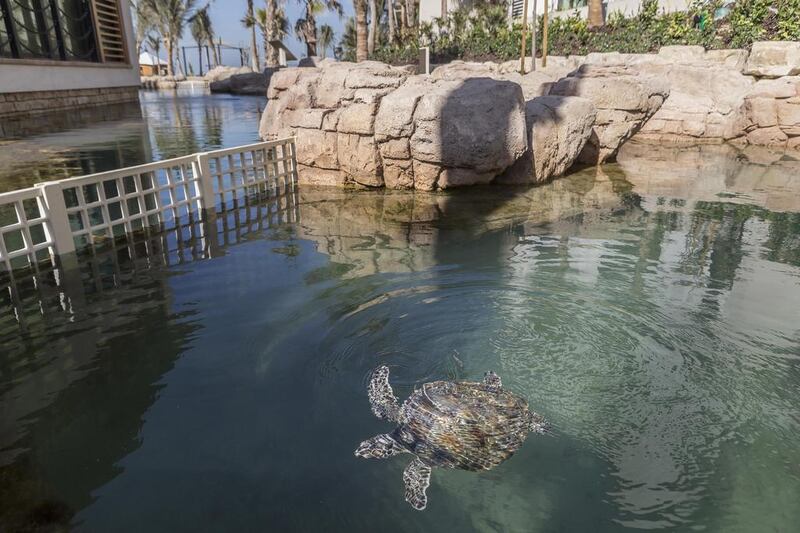DUBAI // As the colder weather creeps in, conservationists are urging beachgoers to be on the alert for stranded turtles.
Warren Baverstock, operations manager for the Aquarium and Dubai Turtle Rehabilitation Project at the Burj Al Arab, said more turtles were expected to wash up on beaches in the coming weeks.
“November to March is the main season where we get most of our stranded turtles as temperatures drop,” he said.
“Typically, we can get about 8 turtles a day on average but if we have a storm and rough seas we’ve had as many as 50 handed in by the public in one day.”
So far, 120 yearling Hawksbill turtles and 10 larger Green and Loggerhead turtles have been rescued during this season.
Young Hawksbills are particularly at risk in colder water as it slows their metabolism, making them weaker.
Despite conservation efforts it is estimated that only 8,000 nestling female Hawksbills are in the wild. “Normally a healthy turtle will rub its shell on rocks, which removes any barnacles they get,” said David Robinson, the assistant operations manager at the centre. “But when they get cold their metabolism drops and they become weaker, as a result they clean themselves less and barnacles start to build up, making the turtles heavier and it becomes more difficult for them to swim.”
Turtles too weak to swim then get washed up on the beaches in Abu Dhabi, Dubai and Sharjah.
The centre works closely with organisations such as the Environment Agency Abu Dhabi, Emirates Marine Environmental Group, Dubai Municipality and the Ministry of Climate Change and Environment.
“One of the biggest mistakes we see from the public is they think that if they just remove the barnacles from the shells then the turtles will be fine to swim again but that is not the case,” said Mr Robinson.
“The barnacles are a symptom of potentially more serious underlying health problems, such as infection, that have already taken hold.
“We’ve seen people use knives and screwdrivers to remove barnacles but a turtle’s shell is sensitive and that often leads to further infection and sometimes death.”
Members of the public who see an abandoned turtle are advised to place it in a plastic container with about a centimetre of fresh, lukewarm water and cover its shell with a small wet towel.
“Don’t cover its face as this can lead to suffocation,” said Mr Baverstock.
They should then contact the rehabilitation centre to arrange a time for collection.
“People shouldn’t feed these turtles, which should be kept away from air conditioning and direct sunlight,” he said.
After collection the turtles are placed into fresh water containers for two to three days to allow for barnacles to be removed naturally and for treatment on any infections or other health problem they may have.
As the turtles get stronger they will be placed into small temperature controlled tanks allowing them to swim more easily and recover from the cold.
“A healthy turtle will be active and swimming around whereas those that are still unwell will be lethargic and not dive underwater,” said Mr Robinson.
Once they are strong enough, the turtles will be moved to a purpose built outdoor lagoon at the Jumeirah Al Naseem hotel.
The lagoon has a range of turtles, including a very rare Olive Ridley Turtle, of which there are only estimated to be 25 nesting females in the Gulf.
“We have designed the lagoon with rock formations that turtles with buoyancy issues can rest under,” said Mr Baverstock.
“Also, the large lagoon gives them plenty of space to swim around. It is important that the public see how we do our conservation work and we run visits from schools to help educate children.”
Only when the turtles are strong enough and the weather is suitable will the turtles be -released back into the sea, -usually when the water warms up – between April and June.
The Dubai Turtle Rehabilitation Projection is a collaboration between Jumeirah, The Dubai Wildlife Protection Office, The Central Veterinary Research Laboratory and specialised vets.
nhanif@thenational.ae





